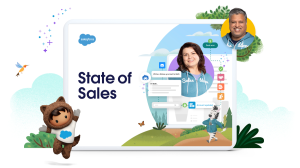According to new research released today in Salesforce’s sixth State of Sales report, 59% of sales reps in the UK and Ireland (UKI) don’t expect to meet their quota this year, a fall from the 78% who missed it last year. These numbers highlight the significant pressure sellers are under. Lagging productivity may also be a factor. UKI sales reps report spending 71% of their time on non-selling tasks, making it difficult to connect with prospects.
But there is good news. To address these challenges, many companies are using predictive and generative AI to free reps to focus on selling and building trusted relationships with customers. In fact, 79% of UKI sales teams are either experimenting with or have fully implemented AI.
The State of Sales report includes these and other insights from 5,500 sales professionals across 27 countries – including 300 UK and 100 Irish respondents. The findings provide important insights into how companies drive growth and stand out in a crowded marketplace.
Reps say selling has gotten more challenging amid heightened competition
Across most sales organisations, revenue growth isn’t keeping pace with company goals. In the UKI, sales professionals say supply chain issues and changing customer demands are their top obstacles. Meanwhile, 59% of UKI sellers say competition has gotten more challenging since last year, and only 12% say it’s gotten easier.
Nonselling tasks pull reps away from customer relationship building
Customer expectations, supply chain issues, and competition aren’t the only obstacles to sales. Non-selling tasks, such as administrative work and meeting preparation, consume 71% of UKI reps’ time. Without time carved out for critical selling efforts, reps struggle to connect with customers.
“Deep relationships with customers are the difference-makers when it comes to challenging sales environments,” said Ketan Karkhanis, EVP and GM of Sales Cloud at Salesforce. “B2B buyers are more likely to purchase when reps act as trusted advisors. However, too often, deep knowledge of customer need and opportunity is lacking or not effectively communicated. That makes it difficult to build trust, derailing deals.”
Deep relationships with customers are the difference-makers when it comes to challenging sales environments.
Ketan Karkhanis, EVP and GM of Sales Cloud at Salesforce
Sellers see accuracy, personalisation benefits from AI despite adoption hurdles
In a climate of heightened competition and scarce hours in the day to sell, many sales teams are looking to AI for support. Currently, 45% of UKI sales organisations are experimenting with AI, and an additional 34% say they have the technology fully implemented in their operations. Of course, given the exceptionally rapid pace at which AI is evolving, whether teams consider their current implementations complete may change in the future.
Regardless, the benefits of AI for sales teams are clear and growing. Worldwide, when asked to name where AI has had the biggest impact, sales professionals point to five key areas:
- Sales data quality and accuracy: From error detection to automatically updating deal records, AI can ensure data is up-to-date and free from human error.
- Understanding customer needs: AI can analyse customer feedback from a variety of sources to gauge customer sentiment and identify areas of need before a sales rep presents a solution.
- Personalisation for customers: Sales teams can leverage predictive analytics to forecast a buyer’s future order based on past purchases, provide recommendations to upsell, and more.
- Sales forecasting accuracy: From highlighting pipeline red flags to projecting closed deals, AI can deliver insights to help shape revenue-generating sales strategies.
- Prospect/customer communications: Teams are tapping generative AI grounded in trusted customer data to write personalised emails to prospects — saving time trying to craft a message manually.
However, there are some obstacles to successful AI implementation. In the UKI:
- A third (32%) of UKI sales operations professionals using AI say their teams lack resources or headcount to support the new technology, while a similar proportion (31%) cite insufficient employee training as an adoption hurdle.
- Data — the foundation of effective AI models — is also a concern. Only 31% of UKI sales professionals completely trust the accuracy of their organisation’s data.
Sales teams are taking action to address these obstacles. Fifty-four percent of AI-using UKI organisations have created training programmes for the technology, while similar numbers have implemented additional data security measures (52%) or consolidated their tech stack (50%), which helps streamline data.
“AI is no longer a nice to have — it’s a must,” noted Sales Cloud CMO Amber Armstrong. “Its impact is greatest when every tool in a team’s tech stack is consolidated. Having a single platform — like Sales Cloud — allows sellers to leverage comprehensive data for the most accurate, relevant AI outputs. It also streamlines workflows for maximum productivity.”
Companies with AI also see improved employee retention
Beyond the benefits to core sales motions, across the globe AI is linked to higher employee retention. High levels of stress can threaten employee longevity, but on teams with AI, sales reps are 2.4x less likely to feel overworked. This can help lower anticipated staff turnover: two-thirds of reps using AI globally say they have no intention of leaving, compared to just over half on teams without AI.
Global data also suggests that AI is not replacing sales jobs, as some fear. Quite the opposite: 68% of sales teams with AI added headcount in the past year, compared to 47% of teams without AI.
“In the era of AI-driven sales, the value of retaining skilled reps has never been more critical,” said Karkhanis. “Employee retention keeps staffing and training costs down. So, by investing in both cutting-edge AI technology and the continuous development of our people, we ensure that our teams are not only more productive but also more engaged and committed, leading to stronger teams and higher sales.
More information
- Read the full State of Sales report
- Deep dive into how sales teams use generative AI
- Explore the Stat Library, Salesforce’s bookmarkable database of stats for journalists
- Discover how the predictive and generative AI capabilities of Sales Cloud help improve productivity
Methodology
Data in this report is from a double-anonymous survey conducted from March 8 through April 18, 2024. The survey generated 5,500 responses from sales professionals across North America, Latin America, Asia-Pacific, and Europe, including 300 UK and 100 Irish respondents. For more demographic information, please refer to the full State of Sales report.















